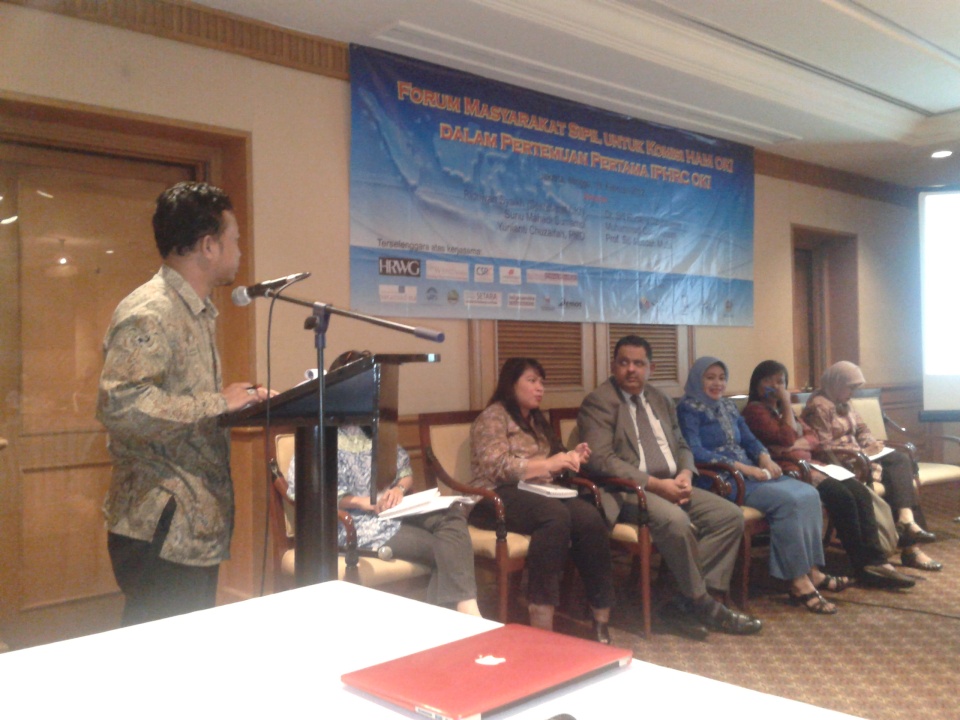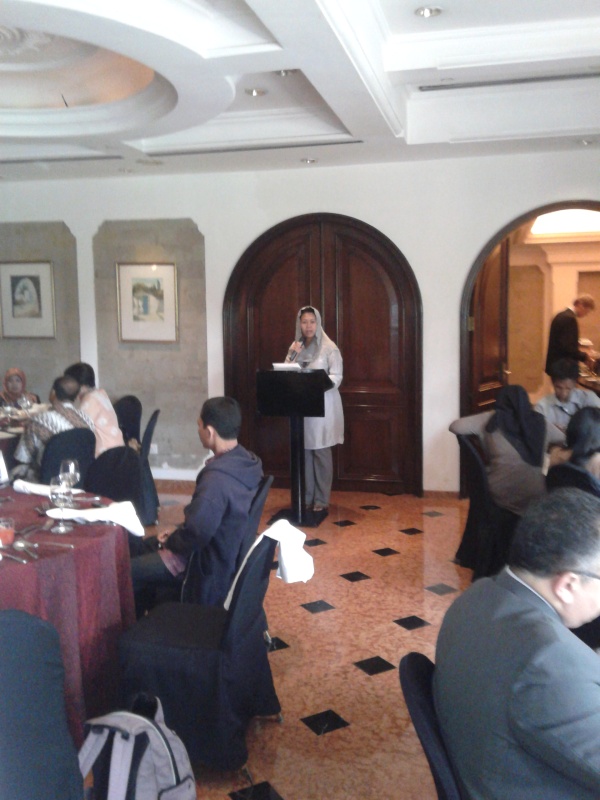The international human rights community faces daunting challenges in advancing human rights in the Muslim world.
Despite being well placed to address those challenges, the most important organization among Muslim states, the OIC, has so far failed to do so. Over the course of the past decade, the OIC has been working to correct this. It has become an active participant in international debates concerning human rights.
In 2008, the organiza¬tion’s charter was revised to include the promo¬tion and protection of “human rights and funda¬mental freedoms” among its goals. The revised charter also paved the way for an Independent Permanent Commission on Human Rights (IPHRC) to promote the civil, social, and economic rights enshrined in the organization’s human rights documents. In establishing the IPHRC and thereby formalizing its human rights agenda, the OIC has taken an important step in the right direction.
In September, a group of specialists in Islam and human rights came together at the Danish Institute for Human Rights in Copenhagen to discuss the IPHRC’s potential as an advocate for human rights in OIC’s member states. The group formulated a set of recommendations which were sent to the OIC, outlined at the end of this article.
Introduction
In June 2011, foreign ministers of countries part of the Organization of Islamic Cooperation’s (OIC) met in Kazakhstan to establish a new human rights commission: The Independent Permanent Human Rights Commission (IPHRC). After first meeting in Jakarta in February 2012 and Ankara in August 2012, the commission concluded its third session in Jeddah in October 2013.
With a mandate to ”advance human rights” and “support the Member States’ efforts to consolidate civil, political, economic, social and cultural rights,” the IPHRC has the potential to become a much-needed forum for constructive exchange of experiences, introspection and internal criticism among OIC member states. As a government representative said at the meeting in Kazakhstan: “It will be 100 times better to hear what is happening in our countries from our own people rather than from the outside world.” But if the IPHRC is to live up to its potential and not end up serving as window-dressing for notorious human rights violators, it needs to strengthen and clarify its position with regard to a number of areas.
Introducing human rights to the OIC agenda
The OIC was founded in 1969 for the purpose of strengthening solidarity among Muslims. In its first decades, the organization focused especially on the Palestinian cause, the protection of Islamic holy sites and the strengthening of economic cooperation between member states.
Currently, as an intergovernmen¬tal body, it is second only to the UN in terms of membership and scope. It has 57 members – most, not all, are Muslim-majority states. It deals with a range of issues: peace and conflict resolu-tion, Muslim minority communities, women’s and children’s rights, humanitarian assistance, com¬bating Islamophobia, the promotion of intra-OIC trade and investment, cultural exchange, and education.
International human rights were not high on the agenda. On the contrary, in 1991, the organization presented the so-called Cairo Declaration on Human Rights in Islam, introducing what many human rights scholars considered an alternative set of rights that were based on certain interpretations of Islamic law that are contrary to international human rights standards. Together with the grave human rights violations of many member states, initiatives such as this one have given the OIC a dubious reputation with respect to international human rights.
In 2005, a plan to reform the organization, the “Ten-Year Programme of Action,” was introduced, resulting in major changes. An important part of this was the introduction of human rights to the OIC agenda, in particular the establishment of the IPHRC. “Establishment of an independent human rights body by the OIC Member States is considered to be one of the major steps in the transformation process of the OIC,” an OIC newsletter states.
The Independent Permanent Human Rights Commission
The IPHRC was formally established in June 2011 and held its first session in January 2012. The commission consists in 18 experts, of whom six are from the Arab member states, six from the Asian member states and six from African member states. All experts are elected for a period of four years. According to the statutes, the IPHRC and its 18 experts will work to “advance human rights” and “support the Member States’ efforts to consolidate civil, political, economic, social and cultural rights.” This is to be done through providing counseling and legal advice to member states, information campaigns, research and cooperation with other human rights organizations.
At the inaugural speech in IPHRC’s first session in Jakarta in 2012 and during the opening remarks at the third session on Oct. 26, 2013 in Jeddah, the secretary-general, Professor Ekmeleddin İhsanoğlu, outlined five principles. First, the commission will complement rather than replace other national and international human rights mechanisms. Second, it will follow an introspective approach, helping OIC member states improve human rights practices. Third, it will fulfill a guidance function, providing member states with services like human rights training for the police. Fourth, it will take an incremental approach, building its credibility and mandate over time. And finally, the commission will prioritize the most pressing hu¬man rights problems. These principles put forward by İhsanoğlu were also endorsed by the commission.
Human rights experts’ recommendations to the IPHRC
In September 2013, the Danish Institute for Human Rights invited a group of international human rights researchers to discuss the OIC’s new human rights approach, with a particular focus on the IPHRC. Due to the relative novelty of the IPHRC and the scarcity of concrete initiatives, statements and activities proposed by the commission so far, the researchers did not find that there was ground for an evaluation of the IPHRC as such.
The specialists also noted that despite its shortcomings, the IPHRC has poten¬tial to become an advocate of human rights in the OIC’s member states. To this end, the group formulated a number of recommendations for the commission to take into consideration in its future work.
The following recommendations, proposed by the human rights experts, whose members are listed below, offer concrete suggestions for how the IPHRC can realize its mission in a way that is consistent with the above five principles that İhsanoğlu outlined and the commission endorsed.
The IPHRC should affirm and uphold internationally agreed upon human rights standards and instruments. This includes:
- Recognition by commissioners that OIC member states are bound by international human rights obligations.
- Agreement among commissioners that international human rights treaties constitute minimum standards and that regional human rights instruments must always meet, or exceed, these minimum standards.
- Agreement among commissioners to use only international human rights law as the benchmark in assessing all human rights issues, and clarification of the status of the Cairo Declaration to this end.
- Review of existing member states’ reservations to international human rights treaties, and elaboration of recommendations to remove reservations that undermine the object and purpose of the treaty in question.
- Affirmation of Shariah consistency with international human rights law by rejecting interpretations of Shariah that violate or undermine international human rights law and by elaborating alternative interpretations that respect and further international human rights law.
The IPHRC should encourage and practice transparency and accessibility in its activities. This includes:
- Publication of a comprehensive calendar of meeting times and places well in advance to facilitate participation from civil society, media and other actors interested in the IPHRC.
- Establishment of a system for the rotation of sessions across member states.
- Development and maintenance of a regularly updated website with information on IPHRC activities and statements, as well as other human rights-related OIC activities.
- Establishment of an IPHRC secretariat in a place that is easily accessible to civil society, media and others within and outside the OIC.
The IPHRC should engage with civil society and encourage its participation in the IPHRC’s work. This includes:
- Facilitation of civil society access to IPHRC sessions.
- Organization of civil society forums in parallel with all IPHRC sessions.
- Establishment of cooperation with human rights-related think tanks and research institutions inside and outside the OIC member states.
- Facilitation of inter-sessional dialogue with civil society organizations.
- Facilitation of human rights and civil society organizations’ access and lobby to the member states’ governments.
The IPHRC should engage in regional and international collaboration. This includes:
- Adoption of a common strategy with regional organizations (e.g., the OSCE, or Organization for Security and Co-operation in Europe) for addressing issues of religious intolerance.
- Establishment of institutionalized relations with international human rights mechanisms. These relations could be maintained by holding every third IPHRC session in Geneva or New York.
- Establishment of relations with OIC member states and other relevant experts in UN bodies, possibly by establishment of external advisory board to the IPHRC.
- Appointment of an IPHRC focal person in Geneva to facilitate regular communication with UN human rights bodies.
The IPHRC should strengthen its internal composition. This includes:
- Promotion of gender diversity among IPHRC commissioners.
- Promotion of religious diversity among IPHRC commissioners.
- Ensuring the independence of commissioners.
- Establishment of transparent mechanisms for selecting candidates, ensuring public access to and information on the pool of candidates.
- Establishment of a mechanism that ensures nomination and election of experts with a strong record of defending international human rights standards.
The IPHRC should strengthen OIC and member state capacities and knowledge on human rights. This includes:
- Promotion of peer-to-peer capacity development.
- Promotion of capacity development by external human rights experts.
- Mainstreaming of outputs to relevant OIC agencies and departments.
- Regular publication of thematic reports on human rights in member states.
- Regular publication of country-specific reports.
After completing the above steps, the IPHRC (and the OIC) should ensure sustainable resources for its work. This includes:
- Upgrade of human resources in the IPHRC secretariat.
- Strengthening the IPHRC and its secretariat’s fundraising capacity.
- Encouragement of in-kind support by international human rights experts, institutions and organizations.
- Advertisement of volunteer positions and internships with the IPHRC.
- Introduction of a system for secondment with other international human rights institutions and organizations.
Signatories*
Evelyn Aswad, professor, College of Law, Oklahoma University, US
Mashood Baderin, professor, School of Law, University of London
Verena Beittinger-Lee, Ph.D., researcher, School of Politics and International Relations, University of Kent, UK
Anthony Chase, associate professor, Diplomacy and World Affairs, Occidental College, US
Ioana Cismas, Ph.D., international human rights lawyer, Switzerland
Turan Kayaoglu, associate professor, Interdisciplinary Arts and Sciences, University of Washington, US
Ann Elizabeth Mayer, associate professor, Legal Studies and Business Ethics Department, University of Pennsylvania, US
Mahmoud Monshipouri, associate professor, Department of International Relations, San Francisco State University, US
Johannes Morsink, professor, Department of Political Science, Drew University, US
Marie Juul Petersen, Ph.D., researcher, Danish Institute for Human Rights, Denmark
Heini Skorini, Ph.D. student, King’s College, University of London, UK
*This article reflects the views of its two authors and not necessarily those of the other signatories to the recommendations.
*Turan Kayaoğlu is an associate professor at the University of Washington in Tacoma.
Source: Todays Zaman












 10 November 2013 | by Turan Kayaoglu and Marie Juul Petersen
10 November 2013 | by Turan Kayaoglu and Marie Juul Petersen 
